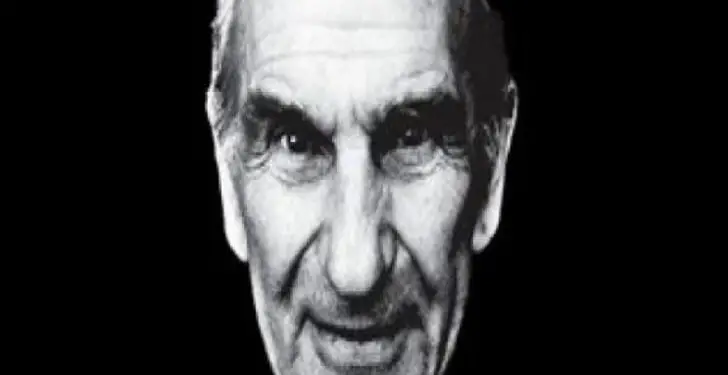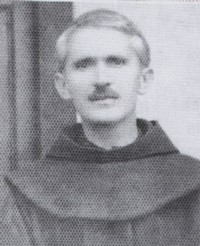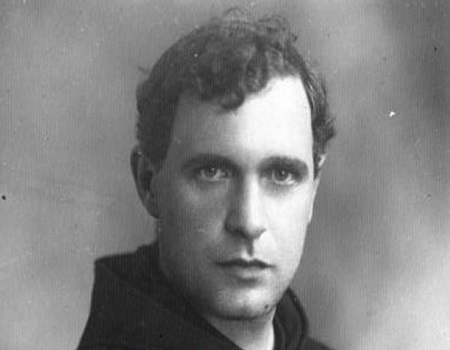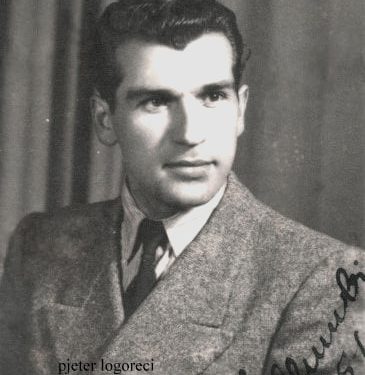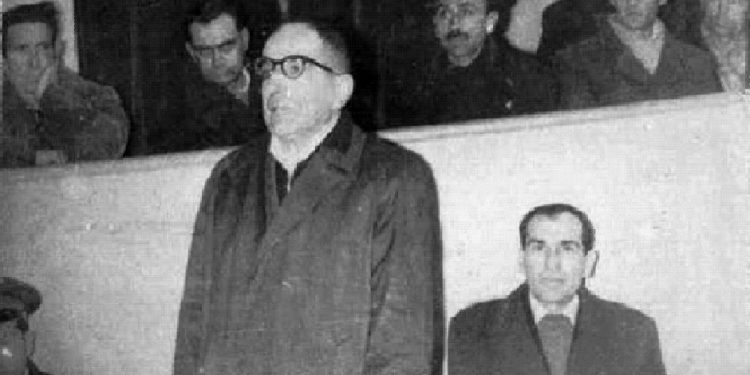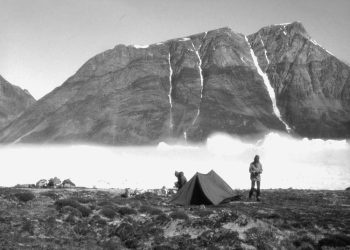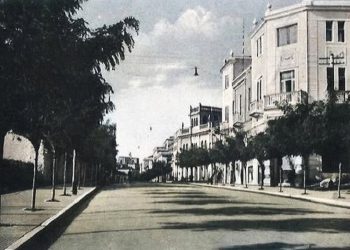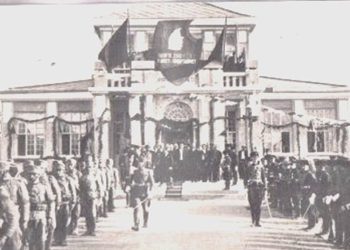From Father Zef Pllumi
THE CAMPS AND PRISONS OF ALBANIA
Memorie.al / At the Franciscan Monastery at Arra e Madhe, were the last remnants of that group of Albanian Franciscan scholars and artists, who once comprised a true, albeit unproclaimed, Academy of Arts and Sciences. The giants had already disappeared; Father Shtjefën Gjeçov, Father Gjergj Fishta, Father Pashko Bardhi, Father Pal Dodaj, Father Vinçenc Prendushi, Father Martin Gjoka, Father Anton Harapi, Father Bernardin Palaj, and Father Gjon Shllaku. Father Donat Kurti was languishing in prison, while still in the Monastery, Father Marin Sirdani, Father Justin Rrota, and Father Benedikt Dema were ending their days.
Father Marin Sirdani was born in Bogë of the Great Highlands, as was his younger brother, Dom Aleksandër Sirdani. At a young age, they both became orphans, without father or mother. Their distant cousins took them in Guci where they lived. Great poverty compelled them to ask for help from the hoxha of Guci. When he learned that the children were from a Catholic family, so as not to change their faith, he took them down to Shkodër and knocked on the doors of Catholic institutions. At the age of 9, he placed Marin in the Franciscan College, while Leka, about 5 years old, he placed in a preschool children’s asylum run by the Servite nuns.
Father Marin always remembered the face of that bearded hoxha who had brought him to the door of the friars; he honored his memory and constantly said that; the hoxha of Guci had been “a Muslim Albanian saint.” The Franciscan College was a cradle of Albanianism, and when Marin grew up, he sought to have Marin Barleti as his life’s ideal. Father Marin’s masterpiece is “Skanderbeg After the Legends,” in which he compiled the last remains of the popular Arbër memories of the hero of the Nation. He also wrote many scholarly articles in the magazine “Hylli i Dritës,” as well as episodes of the wars for independence, which he had lived through.
After he was released from the isolation of the Tirana prison, he lived his old age in the Monastery, avoiding any work, until he quietly ended his days with spiritual tranquility.
Father Justin Rrota
I had him as a teacher at the Franciscan College. How boring his grammar lessons became, as he did not give up, not even a hair’s breadth. But we children also made fun of him, speaking the language of Buzuku. I have always known him to be sick, with great pain in the trigeminal nerve, as well as with the progressive paralysis that made him walk with a limp. In the Monastery, a photo was carefully preserved, which showed the “running race” of three limping friars with sticks. The three cripples were: Father Gjergj Fishta, who had broken his leg at the inauguration of the Cement Factory, Father Sebastjan Hila, a famous singer with paralysis, and Father Justini.
The race was held in the large meadow, behind the Monastery at Arra e Madhe, and Fishta had won, because he took bigger steps and was more stubborn. Father Justini, despite the illnesses he had, was a tireless worker who did not waste a single minute. At some point, the paralysis got worse, so much so that not even the stick was useful for support, but he held onto the walls. When he returned to the chair next to his work desk, he felt strong there. Surprisingly, the more the disease progressed, paralyzing his body, the more his language and speech developed.
We would often go during the day to help him with any need he might have or just to relieve his boredom, and we always stayed there for a long time with him, as the words flowed, one pulling the other out, like cherries from a basket. He read the press every day, but not like the rest of us: “Look at the kind of Albanian they write here! Two words in Albanian, four in Turkish and four in French! Instead of moving forward, we are moving backward.” Meanwhile, he only dealt with linguistics, examining authors, from Gustav Meyer to Çabej. He had some special studies, for example, on the “ë,” etc.
Generally, the rest of us who went there did not deal with linguistics like him, so we teased him by saying that language does not move according to the rules set by paralyzed scientists, because it was the symbol of freedom, which leads as the people please. Then he, with the harsh language he had, would attack, denouncing historians as liars and manipulators of events and that poets were the most primitive people.
When his illness worsened, they brought a villager from Troshan, called Llesh Biba, mainly to serve him, but also to work in the kitchen. When Father Justini rang the bell, Lleshi would run to him. For one reason or another, they often quarreled. One day, Father Ciril Cani came from Bajzët.
His sandal had broken on the way, and as soon as he entered the kitchen, he asked Llesh if he had any thumbtacks. “You want thumbtacks?” Lleshi asked. “I don’t have any, but if you want thumbtacks, go to Father Justini, he has a big box full and in all sizes.” Father Cirili, with the sandal in his hand, went to his room and said: “Father Justin, please give me 5-6 thumbtacks, my sandal is broken!” “I have thumbtacks?! … The cross of Christ be with you… And who told you I have thumbtacks?!” When the rest of us found out, we told him: “The villager did it well, so include this in your linguistic studies too”!
Usually, his room was visited by teachers and professors, especially of language, to whom he often gave his manuscripts, without fearing that they might end up “processed” under someone else’s name…! When someone said this to him, he replied that people with a healthy moral compass would not act that way. One day he sent me to one of those professors to ask for a book for a few days. When I returned with it in hand, Father Justini looked at it with great surprise, because on the first page, the book had a big hole; when he looked at page 100, he found his own stamp: “Look,” he said to me, “this book was once mine and it has been two years since I found it.”
“You must have forgotten,” I said, “that saying that goes; ‘he who gives the book is a fool, but even more of a fool is he who returns it’.”
I remember well that he attached great importance to the manuscript of the Albanian Language Grammar, which he had prepared for publication and which the Institute of Linguistics in Tirana had requested. I don’t know what happened to that work, as well as many of his other studies.
The Franciscan school at that time was famous for its mastery of the classical Latin language, with famous professors: Gjeçov, Fishta, Marlaskaj, Prendush, and so many others. But, above all, Father Justini shone, who had compiled a book of epigrams in that language. He was a true scientist, who only in the last three months left linguistics and, without being able to move from his bed, endured the illness until he gave up his spirit.
Father Benedikt Dema represented the most accurate type of a steel-willed scholar: always with his head down in studies. In everything, he sought accuracy, so we called him a pedant, while in reality, he was an encyclopedia. Still, we said about him that he had the ability to make simple problems incomprehensible. He worked for many years on a five-volume Encyclopedic Dictionary; from what we know today, we are left with the first part of that dictionary.
He wrote many articles and translated even more. The most important work of his that we are left with is the book “Father Gjergj Fishta,” which contains many writings for the knowledge and evaluation of Fishta, as well as the most complete and accurate bibliography of this writer.
Until 1967, he lived a quiet life inside the Franciscan Monastery, where his only entertainment was the knowledge of the unknown. When the churches and monasteries were finally closed, he took refuge with his nephews and died, it seems, from an illness caused by the inability to continue the quiet life of the libraries. With the reorganization of the Province, the economic situation improved a lot and thus it was decided to take care of the imprisoned friars: this task, among others, was assigned to me.
At that time, there were still 12 friars in prison, scattered from the Tepelenë camp, to the internment camps and labor camps: Bedeni No. 2, Ura Vajgurore, Ura e Bonos, Kafaraj, Levan Fier, and Karavasta, Rinas, Tirana (Meat Combine and Sanatorium), as well as in Burrel Prison. Only Father Marin Sirdani was still in the isolation rooms in Tirana, where we could not meet him or give him any help.
At that time, communication was completely absent. There was a bus to Tirana, but then you had to wait on the main road for a truck to pass by; the hope remained only in the heart of the driver who had to be paid generously, otherwise you would remain on the main road for days and days, and perhaps even rainy, windy, and cold nights. In Tepelenë, Father Viktor Volaj and Father Ferdinand Pali were interned. One day I left from Shkodër to Tirana. The next day from Tirana to Vlora. I left my clothes at the Servite Sisters’: there were about five of them, who, in addition to sewing clothes, also kept a preschool children’s asylum.
Mother Tereza Manovi was one of those rare courageous women who with authority, knowledge, and virtues, surpassed even men. Thanks to her authority, that convent of nuns had remained a blooming oasis of the Catholic Church, right in the cradle of the most savage Albanian communists: in Vlora. She knew nothing about those two interned friars in Tepelenë, but she gave me directions on how to get there.
I slept that night at the port, at Dom Mark Vasa’s house, right by the sea, now transformed into a hotel. The next day I went out on the road and was lucky with a truck that was going to Salaria. On the way, the curious driver, I did not tell him that I was a cleric, but that I was going to meet a family, a relative and a friend, interned in Tepelenë.
After a few hours of traveling, he said to me: “This is the internment camp. Do you want to sleep here tonight?” “No,” I said, “if I can, I’ll return even if it’s late.” “After I load coal in Memaliaj, I’ll wait for you here.” I was surprised. On a hill, opposite the Castle of Ali Pasha Tepelena, there in Gryka e Bënçës, were four large barracks, built a few years earlier by the Italian army.
The interned families lived there, about 2,500 people: old people, women, and children. Great sadness came over me, when I approached the enclosure door. I looked for Ferdinand Pali. I was told that Ferdinand had not yet returned from Bënça, but he should be coming with wood now. While I waited, some internees passed by and asked me.
Everyone knew him, because he was the friar of everyone, of Christians and Muslims. When they were sick or when they died, he prayed and performed the religious rites with the greatest devotion, without distinguishing anyone, saying: “God sees our trouble and may He have mercy on us”! At some point, Father Ferdinand came with a log on his shoulder and a stick in his hand. We hugged with love, but then, when I gave him those few clothes and food, he started shouting: “Why so little?! Do you see that I am half naked and always hungry?” He had a reason to shout, since it was the first time after 6 months that he was getting some help, but I also had a reason, since such a long and uncertain road for communication could not be taken with more clothes than 10 kg.
Then on that same path, on my way back, I would also stop at Ura Vajgurore and Ura e Bonos and in Levan. I told him that from now on, we had decided on a small monthly aid for each one.
Father Ferdinand said to me: – “I have nothing to tell you, since you have experienced the prisons yourself, the hard work and endless hunger. All the food we eat is spoiled: the rice has worms, the bread and pasta are moldy, the leeks and potatoes are rotten.
God knows, but sometimes you think badly and we suspect that they are also poisoned. Think that a few weeks ago, 83 small children died in this camp: all of them within 4-5 days! We cry and cannot speak. And what is worse: when those from the party come to give us conferences, we have to clap and wish a long life and health to the one who torments us”! – “I try with all my care for you, but who listens to me?” I said. – “I am the last hole of the pipe.”
During these years, I have not celebrated Easter or Christmas with the brothers in the Monastery, because I took the path with clothes in my arms, to be able to comfort the imprisoned friars a little, which were melting away from exhaustion in the forced labor camps. Once, when I went to Tepelenë, to see Father Viktori, they told me that he had been transferred to Vlora. When I returned to Vlora, I looked for him: some of the interned people who were working had been brought there to build a prison.
They did not allow me to meet him, without an authorization from the Internal Affairs Branch. At that time, the head was absent and the deputy head was Dul Rrjolli, who had gained a few more stars on his epaulets. They told me that he was often found in a military club of the Branch. I found him there. When he saw me, he stood up, hugged me in front of all of them, saying loudly:
- “What the hell are you looking for, Zef Pllumi, here in Vlora? Devil! Oh Devil!”
Then I told him that I had really come to Vlora to look for a devil, and with my finger, I pointed to his chest. He put his arm around me and we went outside, walking along the main street of Vlora, and we went around that square three or four times, until it got dark.
- “Do you have a place to sleep here in Vlora?”
- “Yes,” I said, “I have found a place there at the port at Dom Mark Vasa’s house.”
- “That small hotel by the sea?”
- “Yes.”
- “What have you Catholic clergy left undone; to the point of taking the best place in Vlora, so that not even a fly can pass without you knowing! And then you say: No, we have never been agents”! But an agent does not have other horns. I’m sorry, because you also got Tuku into trouble, who was such a good friend. But where is Marin?”
- “He is in Tirana, in isolation.”
- “He was not a bad man, but he made a mistake when he got into politics. What did he need it for, just to get Tuku and himself in trouble! When a person doesn’t know politics, stay away from it, you don’t need anything. Only the Party makes politics”!
When we parted, he told me to meet again at that club the next day, at 10 o’clock, and from there, to go where Father Viktori was working.
The next day, I went early to get the clothes I had left with the nuns and told them that Duli would accompany me to the labor camp. They asked me where I knew Duli from, and I told them the whole story of the Monastery and the prison, nevertheless I told them that he had welcomed me so well, as if we were great friends. I took the clothes and at 10 o’clock, we left the club together with Duli, to go to Father Viktori’s. On the way, he asked me what I was doing now. When I told him that I was at the Franciscan Monastery, he turned to me:
- “What, you never want to leave those foolish things?! In your speech and appearance, you seem like a smart boy, but when it comes to actions, you are completely stupid. Quit those foolish things now. Get a job, start a family, and live like all other people. I’m telling you that, as a cleric, you won’t have anything in order: you’ll die, stretching out your hand like a bad beggar. Do you think about this, or not? People today don’t believe anymore: the few who do believe, the Party will clarify and you, you will be left alone, with no one, not even your brothers looking at you! Listen to me. It’s not too late.”
When we arrived at the labor camp, Duli spoke to those officers who stood at attention. He told them to call Father Viktori to the side, to meet with me and to take those clothes, which, he said, I have checked myself. Then he turned to me:
- “Stay as long as you want with him. When are you thinking of returning to Shkodra?”
- “If I find a ride, even today.”
- “Have a good journey, but put my words in your head: the first mistake is forgiven, but the second, you’ll pay dearly with your life.”
We said goodbye and he left.
In the afternoon when I returned to the nuns and told them that I had met with Father Viktori, they told me that all of Vlora had found out and that they had been ordered to be careful with me, since I had walked arm in arm with Duli, who at that time was the head of the Internal Affairs Branch, and not even the communists liked him, since he was from Shkodra.
During these years, I happened to visit almost all the camps in Albania and suffered so much that it is unbelievable: how many winter nights I have slept outside, in front of the camp wires! Nevertheless, I have done every suffering with pleasure, without sparing myself, since I knew better than anyone what prison and suffering mean.
Thanks be to God, even in all this suffering, a pleasant humorous moment would burst out sometimes. I remember that when I met Father Aleksi at the Kafaraj Camp, I asked him what he needed most urgently, to fulfill it. He told me that he needed a drawing notebook, if there were any, and also a No. 1 pencil.
- “You still think about drawing here in the swamp?”
- “If you want to save me from the hard work, send them to me by mail, so they can arrive as soon as possible. Don’t forget the work we did in Beden and Maliq: almost, Kafaraj and other labor camps are included there too.”
- “No, I can’t forget them.”
- “Look, I got a reputation as a painter, because a policeman found a sketch, like a caricature, in my notebook during the check, and he asked me: did you do this? I replied: yes. After a while, he brought me a photo of his father and I worked on it for him. He liked it very much, but when he took it, he said to me: don’t tell anyone.
After about three days, a friend of his comes and says to me: How beautifully you painted the photo of his father for my friend! Paint one for me too like that. By working for one policeman and another, I ran out of my notebook and pencil. I’m in a difficult situation because that policeman from my brigade is asking me to paint a picture of his father and when I reply that I don’t have paper or a pencil, he continues: come on, start once! But I don’t have anything to start with, and he keeps saying; start, start.”
When I returned to Shkodra, I asked a painter friend of mine for a drawing notebook and a charcoal pencil, which I sent to him by mail, just to ease his heavy suffering. How many times have I asked myself: I wonder if the fine arts, which developed during the slave-owning era, came about to ease the suffering?” Memorie.al




